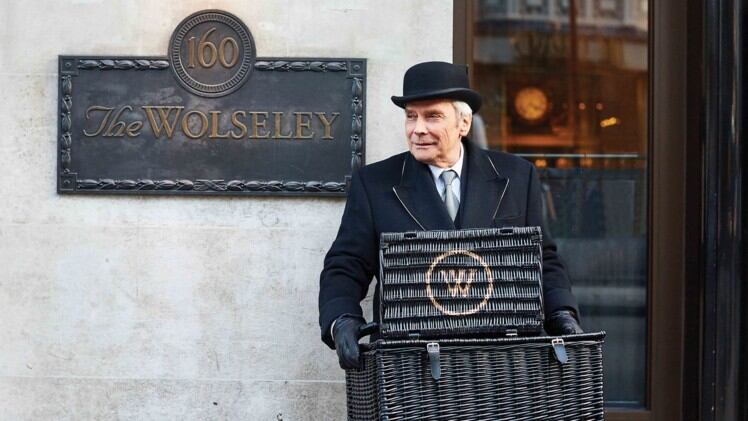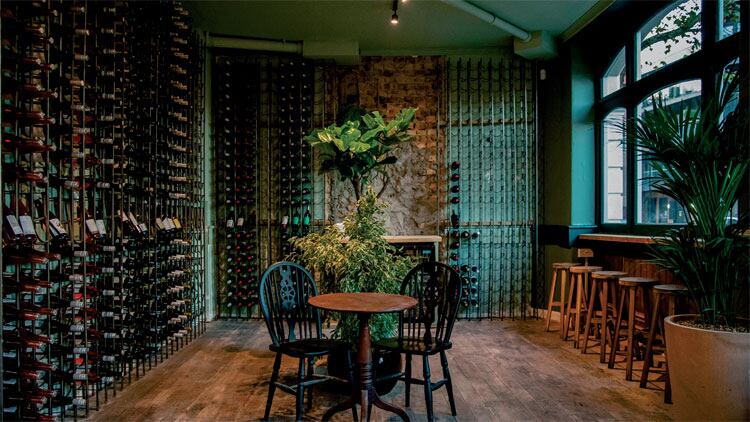Proper plastic reduction
Plastic straws became the whipping boy of 2018 when footage of one being pulled out of the nostril of a sea turtle from BBC’s Blue Planet II struck a chord with people across the world.
Cue much hand wringing with restaurant, pub and café groups large and small announcing they would be banishing plastic straws from their venues in a bid to remove the scourge of society once and for all. And very laudable these moves have been, too, but plastic straws are only the tip of the (melting) iceberg. Some chefs, including Skye Gyngell and Neil Rankin, have made pledges to phase out single-use plastic in their kitchens but, in the main, the industry has been relatively quiet on how it might solve the growing issue of plastic usage beyond replacing plastic straws with annoying paper ones that get all soggy halfway through your drink.
Eliminating plastic entirely from restaurants might be a pipe dream, and the rise of delivery and takeaway is likely to make it harder, but there are things the industry should be doing, from getting rid of cling film in their kitchens and reducing the use of vacuum packaging to demanding produce and ingredients are not needlessly packaged when delivered to the kitchen door.
“The first step, as with any effective reduction strategy is to take stock; assess what you’re currently using, whether it is essential to the business, whether it can be removed entirely or if not, reduced or replaced with a reusable option,” says a spokesperson at the Sustainable Restaurant Association.
“Once you’ve completed a thorough plastic audit, it’s then crucial to engage with your suppliers to confirm exactly what they’re sending you and in what volume.”
The battle against plastic may have started last year, with straws becoming the first fallen victims, but the war rages on. The planet needs you to do your bit.
Make large restaurant groups great again

2018 wasn’t a vintage year for the casual-dining sector, with the CVA becoming the year’s must-have accessory for a number of restaurant chains.
But the goings-on of 2018 did serve as a wake-up call for those players that had lost vision and quality at the expense of hitting expansion targets and higher costs and tightening margins – and here’s hoping that this year they act on these revelations.
While it’s easy to be sniffy about some of the larger restaurant chains, these groups have helped continue to breathe life into high streets hit by internet shopping, and offer (or at least should) consistent and good-value food in family-friendly environments that appeal to people of all tastes.
But the sector needs to take a long hard look at itself, and at what made its restaurants such smash hits in the first place, and bring back some of the magic of when they were starting out, magic that helped change the way people eat today.
The UK’s restaurant sector would be less diverse without the likes of PizzaExpress, Wagamama and Wahaca introducing people outside of large metropolitan bubbles to new flavours and cuisines in an accessible and affordable way. And let’s not forget those growing brands that are now spreading their wings across the country – from Franco Manca and Honest Burgers to Pizza Pilgrims, Dishoom and Rosa’s Thai. For years, bigger didn’t mean better, but big (ish) can still be beautiful.
Tipping ticked off

The issue around tipping rears its head every year, with fresh revelations about the practices of some restaurant or another using tips to boost low wages.
After sitting on the subject for two years, the Government finally announced late last year that restaurants will be banned from keeping tips from staff, but has so far been opaque on when such legislation might become law. Irrespective of that, this year we’d like to see restaurants grab the initiative and end the confusion over tipping once and for all. As Peter Davies, managing director at WMT Troncmaster Services, which advises on the management of fair and compliant tronc systems for hospitality, says: “There’s got to be an end to the confusion, lack of clarity and lack of certainty around tipping. The industry has two strategies that it must take – engage more with Government, and be far more out there in the public domain and tell people ‘this is our practice, and when you choose to pay service charge or a tip it will be dealt with in a way that is fair and reasonable.”
According to Davies, the industry needs to stop treating tipping like Fight Club where no one talks about it. “A reluctance by the sector to engage with critics (such as the unions) has led to a vacuum of information, so it’s no wonder the poor old consumer ends up confused and tarring all operators with a few bad brushes,” he says.
So, what’s the solution? Davies has put together a best practice document that he hopes will form a framework for the industry. Its key points include: when discretionary voluntary payments are distributed to staff, everyone who contributed to the customer’s experience receives a share; the distribution is calculated and managed fairly, independently of the employer, impartially and transparently; that staff feel rewarded, recognised and motivated; and that customers feel confident when making discretionary payments that they are rewarding the team that has contributed to their experience. Sounds sensible to us.
A more diverse workforce

Staff shortages have been a bugbear of the restaurant industry for years, and with Brexit threatening to put a stranglehold on an already tight workforce, it’s time for more employers to reach out to previously untapped pools of talent.
Smart businesses are already taking steps to widen their recruitment strategy in ways not seen since the heyday of Jamie Oliver’s Fifteen. High street groups Pho and The Breakfast Club are working with charities to employ people from marginalised backgrounds, including those who are homeless and ex-offenders, which they say has uncovered some ‘hidden gems’. Just look at the success of The Clink charity, which has seen hundreds of former prisoners graduate from its schemes to find jobs at the likes of D&D London and the Chester Grosvenor Hotel.
But hiring a more diverse workforce can not only transform lives, it also has a business benefit. Restaurant group Corbin & King recently launched an initiative to double the number of staff it employs over the age of 50. “There is so much experience and knowledge among people who have lived a life compared to someone only a year or so out of college,” says co-founder Jeremy King.
Much has been said about the reasons for restaurant staffing shortages, with the finger of blame pointed everywhere from TV cooking shows to catering colleges. Either way, with Brexit on the horizon, restaurants will have to act fast to avoid their own kitchen nightmare, and widening the recruitment pool could mean restaurateurs sleeping more easily at night.
The wine bar revival

Once upon a time, wine bars were the cool places to hang out, seen by many as the more sophisticated alternative to sweaty pubs full of beery (and leery) men. And then, all of a sudden, they weren’t – instead representing tired establishments serving plonk and food deeply rooted in the 1970s to people with considerably more money than taste.
Yet now, thanks to some notable openings in the past few years, including Sager + Wilde, The Winemakers Club, The Laughing Heart and Noble Rot in the capital, wine bars are once again back in fashion. Or at least they should be. While considerable strides have been made in the wine bar genre thanks to these new-wave protagonists, there still aren’t enough places to drink great wine at a reasonable price (without having to sit down for a full meal), with many attempts either too mainstream, with a dull selection
No more no-shows

No-shows are the bane of practically every restaurateur’s life, not only hitting them in the back pocket but damaging team morale when a table of eight fails to turn up for a booking that can’t be filled at short notice.
And yet the problem is something that some restaurant owners are reluctant to tackle head on, with many fearing that tactics such as taking credit card details or deposits will alienate them from their customers – you only need to look at TripAdvisor to see just how many diners don’t like giving card details or paying for anything up front.
But something has to give. Early last year, Scottish restaurateur Mark Greenaway revealed his Edinburgh restaurant (now closed) had 450 no shows or cancellations in just one month, and his isn’t a unique case, with figures suggesting that in big cities the average no-show rate per booking is one in five. Online booking companies have got better at weeding out those that think it’s OK to make multiple bookings for the same evening, but this alone isn’t enough to solve the problem.
What really needs to happen is for pre-payment in some form to become the norm, just as it is in many other leisure sectors (cinema, sports events, music gigs), and that requires collective action. If all restaurants of a certain price point and ambition toughen their stance, diners will have no choice but to fall in line and, before long, won’t give it a moment’s thought. Sounds far-fetched? Possibly. But together the industry can make it happen. It’s time to end bad table manners once and for all.
Brexit cancelled
Restaurateurs in favour of leaving the EU are a rarer species than British kitchen porters. One of the very few to openly come out in favour of it is Gordon Ramsay, who said he voted for Brexit and that it “will be a good thing for lazy Britain”. Let’s see if that’s still his view in a few months’ time when he’s stuck doing the washing up at Royal Hospital Road.
For most restaurateurs, Brexit is a bad idea that’s being delivered even more badly by a Government that doesn’t have hospitality’s needs front of mind, even at the best of times.
From the restaurant industry’s perspective it’s hard to find a single upside to leaving the bloc and the negatives are overwhelming. The situation looks bleak with the UK restaurant industry staring down the barrel of either a deal that will see it on a far poorer footing than before or a no-deal scenario that looks set to make the country’s infrastructure implode.
St John co-founder Trevor Gulliver, who is on the restaurant committee for UKHospitality, describes Brexit as “the most fundamental and important thing to happen to our industry in living memory”, and says the elimination of free movement will seriously damage the industry. “The truth is people will go out of business,” he says. “The great thing about free movement is that people come, now they are not coming. As soon as we come out of the trading deal it will be a nightmare in terms of logistics and paperwork and prices will go up. And as soon as we stop free movement we will be hurting – the quality and diversity of food in this country will disappear.” Is it too late to stop the process? We can dare to dream that it isn’t.
This is a web version of an article that first appeared in the January issue of Restaurant magazine, the leading title for the UK's restaurant industry. For more features, comment, interviews and in-depth analysis of the restaurant sector subscribe to Restaurant magazine here.

